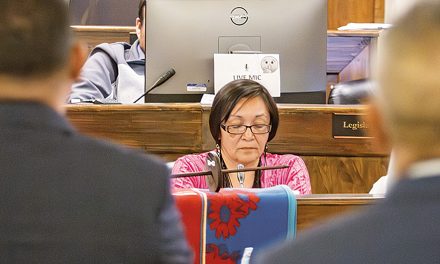
50 Years Ago: Counties close offices to force Diné to pay taxes
Even the Arizona attorney general says what Apache and Navajo counties are doing is illegal but the counties are planning to go ahead and do it anyway.
On March 17 they issued a notice to all reservation residents in Arizona that they would have to pay property tax on their vehicles when they renew their registrations, despite the fact that the federal courts have ruled that Navajos living on the reservation do not have to pay state taxes. And to make the situation even worse, the counties have closed all of their motor vehicle offices in Kayenta, Chinle and Fort Defiance, requiring drivers to travel in some cases more than 100 miles to register their vehicles in either St. John’s or Holbrook.
The state’s attorney general, Gary Nelson, issued a legal opinion stating that the counties have no right to charge reservation Navajos property taxes on their vehicles. But he said he had no authority to force them not to do it. His opinion suggested that Navajos pay the tax under protest and then sue to get the money returned. They should have no problem winning the suit, he said.
Which now brings up Raymond Nakai, the chairman of the tribe, who said in no uncertain terms that the tribe’s legal department will immediately file suit to stop the practice and force the counties to reopen the closed offices. Nakai said he could see no logical reason why the county governments are doing what they are doing because they should know they have no chance of winning the legal battle and it will cost them to defend their actions in court.
Maybe they are trying to make a point that it is unfair that Navajos don’t have to pay property taxes while off-reservation residents do. Maybe they are upset at the cost, said Nakai, of operating offices on the reservation paid for by off-reservation taxpayers. Whatever the reason, he said the tribe will fight anyone who refuses to accept both state and federal laws in this regard.
In other news, Navajo officials who deal with persons who abuse alcohol are going all out to get grass-roots Navajos to attend a two-day alcoholism conference.
In the first place, they have convinced Peter MacDonald, the head of the Office of Navajo Economic Opportunity, to be the main speaker under the belief that he has a lot of support among grass-roots Navajos on the reservation.
Secondly, conference officials have announced that the entire conference will be in Navajo. For the first time, no one will be allowed to speak in English. This is being done in hopes that grass-roots Navajos will be more comfortable if they know that only Navajo will be spoken.
And if this isn’t enough, conference leaders are hoping to attract people with the promise of really good food. This is how the Navajo Times is promoting the event. “It is planned to be a lively affair with a feast of mutton stew,” the article stated, “and fried bread on the second day (and five sheep will be presented for this).”
The conference is even trying to hold a Yé’ii Bicheii on the first day. And to top it off, only representatives of tribal programs will have to pay a registration fee.
And finally, Dick Hardwick, the editor of the Navajo Times, recounted this story as one of the crazier things that has happened since he took over management of paper a couple of years ago. He said he was in his office when he received a phone call from a lawyer in New York City by the name of Martin Sonnenberg. It turned out that one of his clients was the Association on American Indian Affairs. Sonnenberg explained that he needed to know the Navajo word for “love.”
Hardwick said he was told by Sonnenberg that he had a friend or client (Hardwick said he wasn’t clear on the exact relationship) whose family had business interests in the Southwest and he had a deep fondness for the Navajo culture. In any case, this friend or client was planning to get married and he wanted to give his bride a locket on their wedding day. And to make the event extra special, he wanted to inscribe the Navajo word for “love” on the inside of the locket. So he got in touch with Sonnenberg and Sonnenberg decided that if anyone knew the Navajo word for love it would be the people who worked at the Navajo Times.
“The Navajo girls in our office scurried around until they found out what the word was and we called Sonnenberg back,” Hardwick said. “So, pretty soon, there is going to be a young woman going about New York City with the words ‘Ayol’a’niinshni’ inscribed on her locket.”
To read the full article, pick up your copy of the Navajo Times at your nearest newsstand Thursday mornings!
Are you a digital subscriber? Read the most recent three weeks of stories by logging in to your online account.








 Highway 264,
Highway 264, I-40, WB @ Winslow
I-40, WB @ Winslow